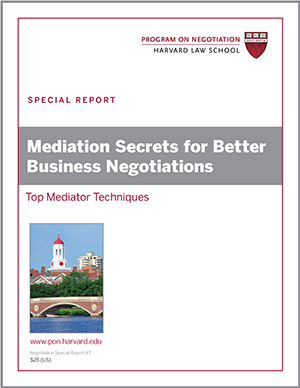
The most difficult peace negotiations in recent decades—in Ireland, the Middle East, the former Yugoslavia, and Sri Lanka—were plagued by a common enemy: violent disruptions by spoilers opposed to the peace process. In each of these cases, extremists stalled negotiations by creating security crises that divided public opinion and drove negotiators apart.
What can be done to insulate ongoing peace negotiations from the terror attacks and other security crises they trigger?
In his book Negotiating Under Fire: Preserving Peace Talks in the Face of Terror Attacks (Rowman & Littlefield, 2008), counterterrorism expert Matthew Levitt analyzes three violent interruptions of the Oslo negotiations for Middle East peace and offers a number of strategies that the leaders of future peace talks could employ to ward off the ill effects of security crises.
Alternative Dispute Resolution and Crisis Communication: 3 Crisis Negotiations Tips for Mediators
Here are three of his suggestions, which may apply in the context of business negotiations and disputes:
Crisis Negotiation Tip #1. Engage in pre-negotiation.
Spoilers often use the element of surprise to disrupt talks. Although the details of outside attacks are difficult to anticipate, negotiators can lessen their impact by meeting before substantive talks begin to discuss the types of crises that could occur and to prepare possible responses.
These nonbinding decisions would have the benefit of prompting parties to address future crises with a united front.
Crisis Negotiation Tip #2. Keep the process moving.
Too often, parties react to disruptions by temporarily calling off talks. Unfortunately, when negotiations stall, parties tend to become pessimistic about their ability to reach their goals (see also, How to Deal with a Difficult Mediator and How Mediation Works).
To foster a positive negotiating environment, parties should agree in advance to continue talks even in the midst of crisis.
Crisis Negotiation Tip #3. Vest leaders in the negotiation.
When trust between negotiators is low and outside threats are likely, solutions imposed by third parties who are seeking to help are likely to fail, argues Levitt. By contrast, leaders who are closely identified with the negotiation process will be motivated to make it succeed.
According to Levitt, leaders must work together to find answers and promote the outcomes of talks to their constituents.
Business negotiators can benefit from preparing to meet obstruction from outside parties. In 2007, for example, investment firms Texas Pacific Group and Kohlberg, Kravis, and Roberts publicly declared that they would not follow through with their intended purchase of TXU Energy, the largest Texas electricity utility, without the approval of the Environmental Defense Fund (EDF), which had sued TXU to block the construction of 11 new coal plants in Texas.
After the buyers promised to build only three plants and adopted a slate of environmental initiatives, the EDF withdrew its lawsuits, and the sale proceeded without disruption.
Related Mediation Article: Top Ten Best Negotiations of 2014 – Here are the top negotiations of 2014, drawing on negotiation research and bargaining case studies this list presents the most notable negotiation tactics and bargaining techniques for the year.
Adapted from “Negotiating in the Shadow of Crisis,” first published in the February 2009 issue of Negotiation.
Originally published in 2015.




